- Home
- Algernon Blackwood
Collected Works of Algernon Blackwood Page 2
Collected Works of Algernon Blackwood Read online
Page 2
The bars of the windows were cold to his hands, yet he stood there for a long time with his nose flattened against the pane and his bare feet on the cane chair. He felt both happy and sad; his heart longed dreadfully for something he had not got, something that seemed out of his reach because he could not name it. No one seemed to believe all the things he knew in quite the same way as he did. His brothers and sisters played up to a certain point, and then put the things aside as if they had only been assumed for the time and were not real. To him they were always real. His father’s words, too, that evening had sorely puzzled him when he came to think over them afterwards: “They’re a baby’s notions.... They’re silly, silly, silly.” Were these things real or were they not? And, as he pondered, yearning dumbly, as only these little souls can yearn, the wistfulness in his heart went out to meet the moonlight in the air. Together they wove a spell that seemed to summon before him a fairy of the night, who whispered an answer into his heart: “We are real so long as you believe in us. It is your imagination that makes us real and gives us life. Please, never, never stop believing.”
Jimbo was not quite sure that he understood the message, but he liked it all the same, and felt comforted. So long as they believed in one another, the rest did not matter very much after all. And when at last, shivering with cold, he crept back to bed, it was only to find through the Gates of Sleep a more direct way to the things he had been thinking about, and to wander for the rest of the night, unwatched and free, through the wonders of an Enchanted Land.
Jimbo, as his father had said, was an imaginative child. Most children are — more or less; and he was “more,” at least, “more” than his brothers and sisters. The Colonel thought he had made a penetrating discovery, but his wife had known it always. His head, indeed, was “full of things,” — things that, unless trained into a channel where they could be controlled and properly schooled, would certainly interfere with his success in a practical world, and be a source of mingled pain and joy to him all through life. To have trained these forces, ever bursting out towards creation, in his little soul, — to have explained, interpreted, and dealt fairly by them, would perhaps have been the best and wisest way; to have suppressed them altogether, cleaned them out by the process of substitution, this might have succeeded too in less measure; but to turn them into a veritable rout of horror by the common method of “frightening the nonsense out of the boy,” this was surely the very worst way of dealing with such a case, and the most cruel. Yet, this was the method adopted by the Colonel in the robust good-nature of his heart, and the utter ignorance of his soul.
So it came about that three months later, when May was melting into June, Miss Ethel Lake arrived upon the scene as a result of the Colonel’s blundering good intentions. She brought with her a kind disposition, a supreme ignorance of unordinary children, a large store of self-confidence — and a corded yellow tin box.
CHAPTER II. MISS LAKE COMES — AND GOES
The conversation took place suddenly one afternoon, and no one knew anything about it except the two who took part in it: the Colonel asked the governess to try and knock the nonsense out of Jimbo’s head, and the governess promised eagerly to do her very best. It was her first “place”; and by “nonsense” they both understood imagination. True enough, Jimbo’s mother had given her rather different instructions as to the treatment of the boy, but she mistook the soldier’s bluster for authority, and deemed it best to obey him. This was her first mistake.
In reality she was not devoid of imaginative insight; it was simply that her anxiety to prove a success permitted her better judgment to be overborne by the Colonel’s boisterous manner.
The wisdom of the mother was greater than that of her husband. For the safe development of that tender and imaginative little boy of hers, she had been at great pains to engage a girl — a clergyman’s daughter — who possessed sufficient sympathy with the poetic and dreamy nature to be of real help to him; for true help, she knew, can only come from true understanding. And Miss Lake was a good girl. She was entirely well-meaning — which is the beginning of well-doing, and her principal weakness lay in her judgment, which led her to obey the Colonel too literally.
“She seems most sensible,” he declared to his wife.
“Yes, dear.”
“And practical.”
“I think so.”
“And firm and — er — wise with children.”
“I hope so.”
“Just the sort for young Jimbo,” added the Colonel with decision.
“I trust so; she’s a little young, perhaps.”
“Possibly, but one can’t get everything,” said her husband, in his horse-and-dog voice. “A year with her should clean out that fanciful brain of his, and prepare him for school with other boys. He’ll be all right once he gets to school. My dear,” he added, spreading out his right hand, fingers extended, “you’ve made a most wise selection. I congratulate you. I’m delighted.”
“I’m so glad.”
“Capital, I repeat, capital. You’re a clever little woman. I knew you’d find the right party, once I showed you how the land lay.”
* * *
The Empty House, that stood in its neglected garden not far from the Park gates, was built on a point of land that entered wedgewise into the Colonel’s estate. Though something of an eyesore, therefore, he could do nothing with it.
To the children it had always been an object of peculiar, though not unwholesome, mystery. None of them cared to pass it on a stormy day — the wind made such odd noises in its empty corridors and rooms — and they refused point-blank to go within hailing distance of it after dark. But in Jimbo’s imagination it was especially haunted, and if he had ceased to reveal to the others what he knew went on under its roof, it was only because they were unable to follow him, and were inclined to greet his extravagant recitals with “Now, Jimbo, you know perfectly well you’re only making up.”
The House had been empty for many years; but, to the children, it had been empty since the beginning of the world, since what they called the “very beginning.” They believed — well, each child believed according to his own mind and powers, but there was at least one belief they all held in common: for it was generally accepted as an article of faith that the Indians, encamped among the shrubberies on the back lawn, secretly buried their dead behind the crumbling walls of its weedy garden — the “dead” provided by the children’s battles, be it understood. Wakeful ears in the night-nursery had heard strange sounds coming from that direction when the windows were open on hot summer nights; and the gardener, supreme authority on all that happened in the night (since they believed that he sat up to watch the vegetables and fruit-trees ripen, and never went to bed at all), was evidently of the same persuasion.
When appealed to for an explanation of the mournful wind-voices, he knew what was expected of him, and rose manfully to the occasion.
“It’s either them Redskins aburyin’ wot you killed of ’em yesterday,” he declared, pointing towards the Empty House with a bit of broken flower-pot, “or else it’s the ones you killed last week, and who was always astealin’ of my strorbriz.” He looked very wise as he said this, and his wand of office — a dirty trowel — which he held in his hand, gave him tremendous dignity.
“That’s just what we thought, and of course if you say so too, that settles it,” said Nixie.
“It’s more’n likely, missie, leastways from wot you describes, which it is a hempty house all the same, though I can’t say as I’ve heard no sounds, not very distinct that is, myself.”
The gardener may have been anxious to hedge a bit, for fear of a scolding from headquarters, but his cryptic remarks pleased the children greatly, because it showed, they thought, that they knew more than the gardener did.
Thus the Empty House remained an object of somewhat dreadful delight, lending a touch of wonderland to that part of the lane where it stood, and forming the background for many an enchanting story over the
nursery fire in winter-time. It appealed vividly to their imaginations, especially to Jimbo’s. Its dark windows, without blinds, were sometimes full of faces that retreated the moment they were looked at. That tangled ivy did not grow over the roof so thickly for nothing; and those high elms on the western side had not been planted years ago in a semicircle without a reason. Thus, at least, the children argued, not knowing exactly what they meant, nor caring much, so long as they proved to their own satisfaction that the place was properly haunted, and therefore worthy of their attention.
It was natural they should lead Miss Lake in that direction on one of their first walks together, and it was natural, too, that she should at once discover from their manner that the place was of some importance to them.
“What a queer-looking old house,” she remarked, when they turned the corner of the lane and it came into view. “Almost a ruin, isn’t it?”
The children exchanged glances. A “ruin” did not seem the right sort of word at all; and, besides, was a little disrespectful. Also, they were not sure whether the new governess ought to be told everything so soon. She had not really won their confidence yet. After a slight pause — and a children’s pause is the most eloquent imaginable — Nixie, being the eldest, said in a stiff little voice: “It’s the Empty House, Miss Lake. We know it very well indeed.”
“It looks empty,” observed Miss Lake briskly.
“But it’s not a ruin, of course,” added the child, with the cold dignity of chosen spokesman.
“Oh!” said the governess, quite missing the point. She was talking lightly on the surface of things, wholly ignorant of the depths beneath her feet, intuition with her having always been sternly repressed.
“It’s a gamekeeper’s cottage, or something like that, I suppose,” she said.
“Oh, no; it isn’t a bit.”
“Doesn’t it belong to your father, then?”
“No. It’s somebody else’s, you see.”
“Then you can’t have it pulled down?”
“Rather not! Of course not!” exclaimed several indignant voices at once.
Miss Lake perceived for the first time that it held more than ordinary importance in their mind.
“Tell me about it,” she said. “What is its history, and who used to live in it?”
There came another pause. The children looked into each others’ faces. They gazed at the blue sky overhead; then they stared at the dusty road at their feet. But no one volunteered an answer. Miss Lake, they felt, was approaching the subject in an offensive manner.
“Why are you all so mysterious about it?” she went on. “It’s only a tumble-down old place, and must be very draughty to live in, even for a gamekeeper.”
Silence.
“Come, children, don’t you hear me? I’m asking you a question.”
A couple of startled birds flew out of the ivy with a great whirring of wings. This was followed by a faint sound of rumbling, that seemed to come from the interior of the house. Outside all was still, and the hot sunshine lay over everything. The sound was repeated. The children looked at each other with large, expectant eyes. Something in the house was moving — was coming nearer.
“Have you all lost your tongues?” asked the governess impatiently.
“But you see,” Nixie said at length, “somebody does live in it now.”
“And who is he?”
“I didn’t say it was a man.”
“Whoever it is — tell me about the person,” persisted Miss Lake.
“There’s really nothing to tell,” replied the child, without looking up.
“Oh, but there must be something,” declared the logical young governess, “or you wouldn’t object so much to its being pulled down.”
Nixie looked puzzled, but Jimbo came to the rescue at once.
“But you wouldn’t understand if we did tell you,” he said, in a slow, respectful voice. His tone held a touch of that indescribable scorn heard sometimes in a child’s tone — the utter contempt for the stupid grown-up creature. Miss Lake noticed, and felt annoyed. She recognised that she was not getting on well with the children, and it piqued her. She remembered the Colonel’s words about “knocking the nonsense out” of James’ head, and she saw that her first opportunity, in fact her first real test, was at hand.
“And why, pray, should I not understand?” she asked, with some sharpness. “Is the mystery so very great?”
For some reason the duty of spokesman now devolved unmistakably upon Jimbo; and very seriously too, he accepted the task, standing with his feet firmly planted in the road and his hands in his trousers’ pockets.
“You see, Miss Lake,” he began gravely, “we know such a lot of Things in there, that they might not like us to tell you about them. They don’t know you yet. If they did it might be different. But — but — you see, it isn’t.”
This was rather crushing to the aspiring educator, and the Colonel’s instructions gained additional point in the light of the boy’s explanation.
“Fiddlesticks!” she laughed, “there’s probably nothing at all in there, except rats and cobwebs. ‘Things,’ indeed!”
“I knew you wouldn’t understand,” said Jimbo coolly, with no sign of being offended. “How could you?” He glanced at his sisters, gaining so much support from their enigmatical faces that he added, for their especial benefit, “How could she?”
“The gard’ner said so too,” chimed in a younger sister, with a vague notion that their precious Empty House was being robbed of its glory.
“Yes; but, James, dear, I do understand perfectly,” continued Miss Lake more gently, and wisely ignoring the reference to the authority of the kitchen-garden. “Only, you see, I cannot really encourage you in such nonsense — —”
“It isn’t nonsense,” interrupted Jimbo, with heat.
“But, believe me, children, it is nonsense. How do you know that there’s anything inside? You’ve never been there!”
“You can know perfectly well what’s inside a thing without having gone there,” replied Jimbo with scorn. “At least, we can.”
Miss Lake changed her tack a little — fatally, as it appeared afterwards.
“I know at any rate,” she said with decision, “that there’s nothing good in there. Whatever there may be is bad, thoroughly bad, and not fit for you to play with.”
The other children moved away, but Jimbo stood his ground. They were all angry, disappointed, sore hurt and offended. But Jimbo suddenly began to feel something else besides anger and vexation. It was a new point of view to him that the Empty House might contain bad things as well as good, or perhaps, only bad things. His imagination seized upon the point at once and set to work vigorously to develop it. This was his way with all such things, and he could not prevent it.
“Bad Things?” he repeated, looking up at the governess. “You mean Things that could hurt?”
“Yes, of course,” she said, noting the effect of her words and thinking how pleased the Colonel would be later, when he heard it. “Things that might run out and catch you some day when you’re passing here alone, and take you back a prisoner. Then you’d be a prisoner in the Empty House all your life. Think of that!”
Miss Lake mistook the boy’s silence as proof that she was taking the right line. She enlarged upon this view of the matter, now she was so successfully launched, and described the Inmate of the House with such wealth of detail that she felt sure her listener would never have anything to do with the place again, and that she had “knocked out” this particular bit of “nonsense” for ever and a day.
But to Jimbo it was a new and horrible idea that the Empty House, haunted hitherto only by rather jolly and wonderful Red Indians, contained a Monster who might take him prisoner, and the thought made him feel afraid. The mischief had, of course, been done, and the terror in his eyes was unmistakable, when the foolish governess saw her mistake. Retreat was impossible: the boy was shaking with fear; and not all Miss Lake’s genuine sympathy, or Nixi
e’s explanations and soothings, were able to relieve his mind of its new burden.
Hitherto Jimbo’s imagination had loved to dwell upon the pleasant side of things invisible; but now he had been severely frightened, and his imagination took a new turn. Not only the Empty House, but all his inner world, to which it was in some sense the key, underwent a distressing change. His sense of horror had been vividly aroused.
The governess would willingly have corrected her mistake, but was, of course, powerless to do so. Bitterly she regretted her tactlessness and folly. But she could do nothing, and to add to her distress, she saw that Jimbo shrank from her in a way that could not long escape the watchful eye of the mother. But, if the boy shed tears of fear that night in his bed, it must in justice be told that she, for her part, cried bitterly in her own room, not that she had endangered her “place,” but that she had done a cruel injury to a child, and that she was helpless to undo it. For she loved children, though she was quite unsuited to take care of them. Her just reward, however, came swiftly upon her.
A few nights later, when Jimbo and Nixie were allowed to come down to dessert, the wind was heard to make a queer moaning sound in the ivy branches that hung over the dining-room windows. Jimbo heard it too. He held his breath for a minute; then he looked round the table in a frightened way, and the next minute gave a scream and burst into tears. He ran round and buried his face in his father’s arms.
After the tears came the truth. It was a bad thing for Miss Ethel Lake, this little sighing of the wind and the ivy leaves, for the Djin of terror she had thoughtlessly evoked swept into the room and introduced himself to the parents without her leave.

 Day and Night Stories
Day and Night Stories Four Weird Tales
Four Weird Tales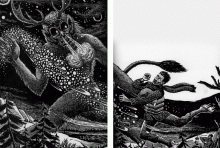 The Wendigo
The Wendigo Three More John Silence Stories
Three More John Silence Stories The Garden of Survival
The Garden of Survival The Extra Day
The Extra Day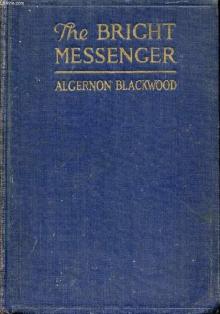 The Bright Messenger
The Bright Messenger Collected Works of Algernon Blackwood
Collected Works of Algernon Blackwood The Empty House
The Empty House Three John Silence Stories
Three John Silence Stories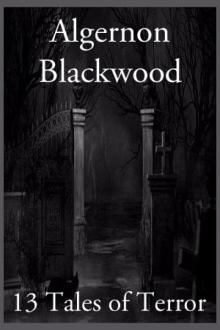 13 Tales of Terror
13 Tales of Terror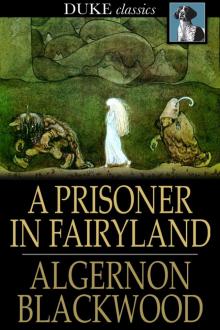 A Prisoner in Fairyland
A Prisoner in Fairyland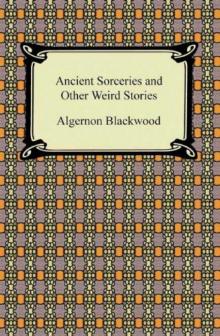 Ancient Sorceries And Other Weird Stories
Ancient Sorceries And Other Weird Stories The Algernon Blackwood Collection
The Algernon Blackwood Collection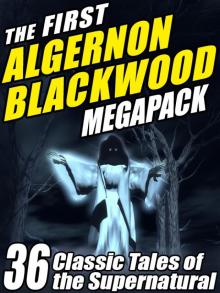 The First Algernon Blackwood Megapack: 36 Classic Tales of the Supernatural
The First Algernon Blackwood Megapack: 36 Classic Tales of the Supernatural John Silence, Physician Extraordinary
John Silence, Physician Extraordinary The Second Algernon Blackwood Megapack: 28 Classic Tales of the Supernatural
The Second Algernon Blackwood Megapack: 28 Classic Tales of the Supernatural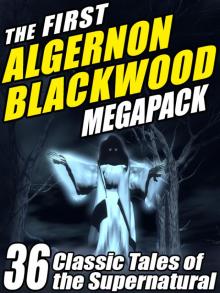 The First Algernon Blackwood Megapack
The First Algernon Blackwood Megapack The Second Algernon Blackwood Megapack
The Second Algernon Blackwood Megapack